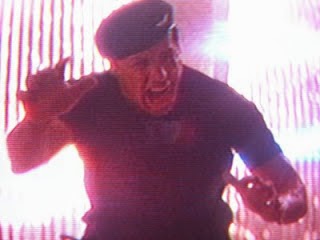It's become fashionable in recent years to point out how many things Demolition Man got right.
For those who haven't seen the film - maybe your parents hated you, maybe you're some sort of pussy, I don't care about your reasons for failing - the film is an action sci-fi comedy starring Sly Stallone.
In the impossible future year of 1996, Stallone plays a maverick cop (because of course he does) who is hunting evil crime lord Wesley Snipes. This is during the "Urban Wars" in mid-nineties L.A. which apparently didn't make the papers.
Snipes' character abducts a bus full of people and Stallone bungee-jumps in to rescue them, because nineties action films habitually blew up the very concept of subtlety and then fucked its wife. On a related point, the building explodes during the gunfight, allegedly killing all the hostages. Stallone's reckless actions are blamed for this, and both men are sent to the "cryo-prison", to be placed in suspended animation until their lengthy sentences have been served.
I'd kinda like a tiny frozen Sly to put in my ice cubes at home...
Thawed out in 2036, Snipes escapes from his parole hearing and goes on the rampage in San Angeles, a mega-city in which everything deemed harmful (smoking, red meat, swearing, violence, alcohol, unregulated sex) has been outlawed, leaving the neutered and ultra-PC populace unable to handle Snipes' old school maniac. As a last ditch attempt to catch him, they thaw out Stallone to fight meat-headed violence with a slightly mumblier form of meat-headed violence.
Aside from a few obvious gaffes like, say, the entire premise, the film is actually surprisingly accurate in a number of its future predictions. Not just obvious ones like Wesley Snipes going to prison, either. Characters are seen using devices that look suspiciously like iPads:
...the cars are self-driving and obey voice commands (something Google is rolling out imminently, if reports are to be believed) and there's even a joke about the "Schwarzenegger Presidential Library," which pre-dates his stint as Governor of California by ten years, and his term as President by twenty-five.*
So far, so what? Lots of people have pointed these things out. Watching the film today, however, I realised that there's something nobody ever addresses.
During one of their many fist fights throughout the movie, Wesley Snipes tells Sly Stallone the that hostages that were "killed" during their final encounter in the past were already dead, and that Stallone's character was set up to look guilty.
Then, at the climax of the film, when Snipes is trying to release every violent prisoner from stasis, they have another fight, Stallone kicks Snipes' head off, and then there's a tremendous explosion that destroys the entire cryo-prison, which Sly runs away from in slow motion because that's how we did things back when movies had proper endings, god dammit.
Pictured: How "Inception" would have ended circa 1993.
Stallone limps into the car park to make out with Sandra Bullock and, in the film's most disappointing scene, doesn't spend an extended fifteen minute sequence beating Dennis Leary into a lumpy red paste.
Wait... What... What about the prison that just blew up?!
Sure, it took out all the madmen and serial killers that Wesley Snipes was trying to release, but there must have been other people in cryo-prison? People who were in for minor crimes? In a society as uptight and puritan as San Angeles is depicted as being, surely there must have been scores of people serving time just for having sex with their partners, or having a beer, or any one of a thousand other trivial "crimes."
And Sly Stallone blew them all up.
So, in a movie with starts with Sly being framed for blowing up a building full of innocent people in his attempt to apprehend Wesley Snipes, he ends by legitimately blowing up a building full of innocent people whilst apprehending Wesley Snipes.
Maybe we didn't do endings so well back in the day after all...
*Probably.



